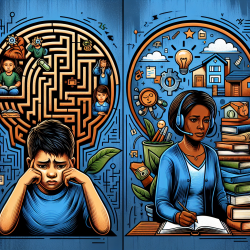The COVID-19 pandemic has revolutionized education, compelling schools worldwide to adopt web-based learning. A recent study titled "Exploring Parental Experiences With School-Aged Children Receiving Web-Based Learning: Cross-Sectional Study" offers critical insights into the parental experiences associated with this shift. This research can significantly aid practitioners in improving their services and strategies.The study, conducted in Jeddah, Saudi Arabia, surveyed 184 parents of school-aged children. The results were revealing: parents' negative experiences with web-based learning (mean 4.13, SD 0.62) exceeded their positive experiences (mean 3.52, SD 0.65). Key findings include:
- The most negative experience was children's boredom from prolonged screen time (mean 4.56, SD 0.69).
- The most positive experience was the enhancement of children's technological skills (mean 3.98, SD 0.88).
- Children's lack of social interaction was a significant stressor for parents (r=-0.190; P=.01).
- Technological skill enhancement reduced parental stress (r=0.261; P=.001).
- 34.2% of parents cited having multiple learners in the same household as a major obstacle.
These findings emphasize the need for targeted interventions to mitigate negative experiences and enhance positive outcomes. Here are some actionable steps practitioners can take:
1. Addressing Boredom and Engagement
Parents reported that children experienced boredom due to prolonged screen time. Practitioners can recommend incorporating frequent breaks and interactive activities to keep children engaged. This aligns with the study's suggestion that boredom significantly affects motivation and interest in learning.
2. Enhancing Social Interaction
Lack of social interaction was a major stressor for parents. Encouraging virtual group activities or safe, socially-distanced meetups can help children build and maintain friendships, thereby reducing parental stress.
3. Technological Skill Development
The enhancement of technological skills was a positive outcome. Practitioners should continue to promote and integrate technology in learning, ensuring that children are well-equipped for future digital demands.
4. Managing Multiple Learners
Having multiple learners in the same household was a common obstacle. Practitioners can offer strategies for time management and creating individualized learning spaces to help families navigate this challenge.
5. Parental Support and Training
Providing parents with resources and training on effective web-based learning practices can alleviate stress and improve their overall experience. This includes offering workshops on time management, technological tools, and coping strategies.
6. Encouraging Further Research
While this study provides valuable insights, more research is needed to explore the long-term effects of web-based learning on both children and parents. Practitioners should encourage ongoing research to continuously improve educational strategies and outcomes.In conclusion, the shift to web-based learning has presented both challenges and opportunities. By understanding and addressing the experiences of parents, practitioners can enhance the effectiveness of online education and support the well-being of families. To read the original research paper, please follow this link:
Exploring Parental Experiences With School-Aged Children Receiving Web-Based Learning: Cross-Sectional Study 









